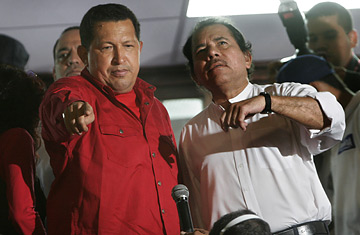
Nicaragua's President Daniel Ortega, right, and Venezuela's President Hugo Chavez greet supporters at the opening game of the Nicaraguan Baseball Professional League final series in Managua.
In a central Caracas subway station, metal barriers, manned by national guardsmen, cordon off a long hallway. The site is reminiscent of a military checkpoint, but the eager consumers seeking entrance are there for a less sinister reason. They're stocking up on basic food supplies such as rice, black beans, and what has, in recent months, become the Holy Grail of edibles: powdered milk.
Shipments of powdered milk from Belarus are providing a temporary respite. The government is "increasing the amount of powdered milk in order to reduce the demand on liquid milk," says Roger Figueroa, executive director of the Venezuelan Milk Industry Chamber. Such shortages of milk and other food staples have intermittently plagued Venezuela since 2003, when the government imposed price controls. Now, the leftist government of President Hugo Chavez is blaming businesses for the crisis even as economic analysts believe the government's own policies have brought about the debacle.
Spurred to action by the defeat of his constitutional referendum last December, Chavez is tackling the problem aggressively for the first time since he took office nine years ago. He says businesses have been hoarding goods until they can be sold at higher prices. In the last two months, he's created a new food distribution company, increased government controls and made overt threats to private business, including the nation's largest food producer and distributor, Polar.
"A monopoly that has been surprised red-handed hoarding needs to face immediate intervention and be taken over by the government," Chavez said during a recent broadcast of his weekly television show, Alo Presidente. And then he pointed the finger: "A clear example is Polar." According to local media reports, the company has undergone more than 70 inspections during the last four months by various government agencies. Polar has denied the accusations, pointing out that it doesn't produce items such as milk, chicken, meat, sugar, coffee and eggs that are regularly absent from supermarket shelves. It does, however, produce one price-controlled item: oatmeal.
Economic analysts place the blame for the shortages elsewhere — specifically on the price controls imposed by the government. The analysts say the controls have destabilized the marketplace. Milk producers, for example, may find it hard to break even selling fresh milk at official prices; and so they find profits by selling their products abroad or by producing cheeses whose prices are not dictated by the government. Perhaps to make up for the lack of profits from regulated staples, non-regulated food items have experieced inflation of 32.7% last year. Perhaps reflecting the effect of price controls on the country's liquid milk industry, daily production levels are at 3.5 million liters a day when ithe industry has the capacity to process 12 million.
Chavez's harangues also have their effect. "Controls of these economic variables can work [to combat inflation]," says Orlando Ochoa, an economist and opposition sympathizer. "However, if you add an aggressive political speech [that threatens] private property... then things become worse, because the private sector becomes reluctant to invest and increase capacity." Indeed, business associations have already expressed concern that recent changes to the Law of Hoarding, Speculation and Boycotting could make it easier for the government to expropriate food-related businesses.
Both analysts and ordinary citizens, however, believe it unlikely that the President now has the mandate to nationalize a giant like Polar. "Chavez wouldn't have the support of a lot of people," says Maria Lozada, 56, from the stand where she sells newspapers in the rundown commercial center of Parque Central. Although she supports Chavez, she voted against his constitutional reforms and believes private enterprise is essential for Venezuela. "Because the other things he's done — like [nationalizing] the telecommunications company — haven't worked well."
Other measures the government has taken to alleviate the food crisis have had a limited effect. In January, Chavez announced the creation of PDVAL, an affiliate of the state oil company, PDVSA, that has been tasked with assisting in food production and distribution; it has set up various distribution centers — such as the one in the Caracas train station — around the country. The National Institute for the Defense of Users and Consumers, INDECU, has been regularly making enforcement rounds, and temporarily shut down more than 500 businesses that were guilty of selling food above the regulated prices during one week in January alone. The issue is increasingly volatile. Lootings have been reported at government-run food storage centers around the country.
While many blame government policies for the shortages, a recent incident speaks to the flip side — a distrust of business that has been fueled by Chavez's fiery rhetoric. Early on the morning of Sunday, Feb. 24, a bomb exploded just outside the entrance to the headquarters of Fedecamaras, a leading business chamber that is critical of the government's economic policies. A 44-year-old man, suspected of planting the bomb and in possession of an honorary Metropolitan Police identification card, was killed in the blast. Fedecamaras called on the government to find those responsible, while Interior and Justice Minister Ramon Rodriguez Chacin assured the public that authorities will bring the perpetrators to justice.
